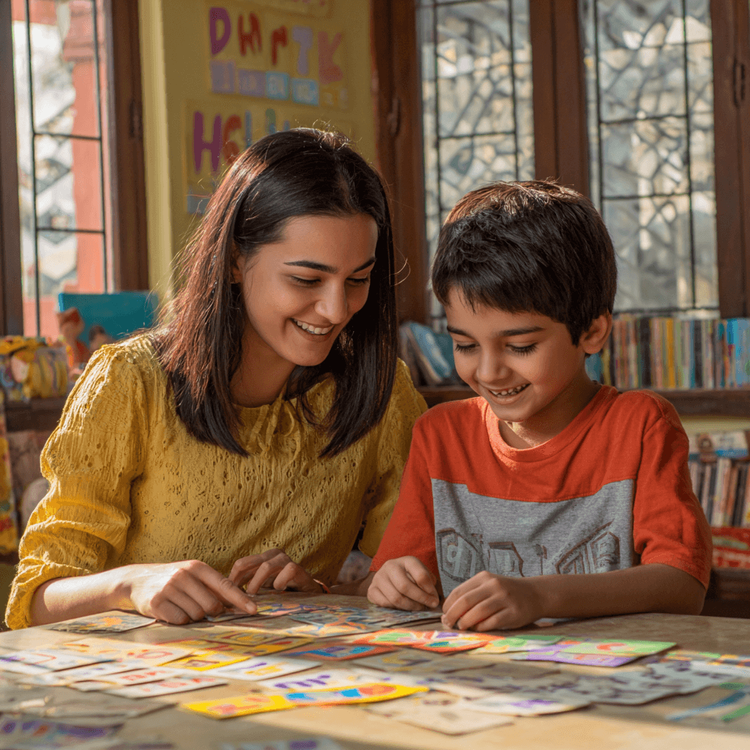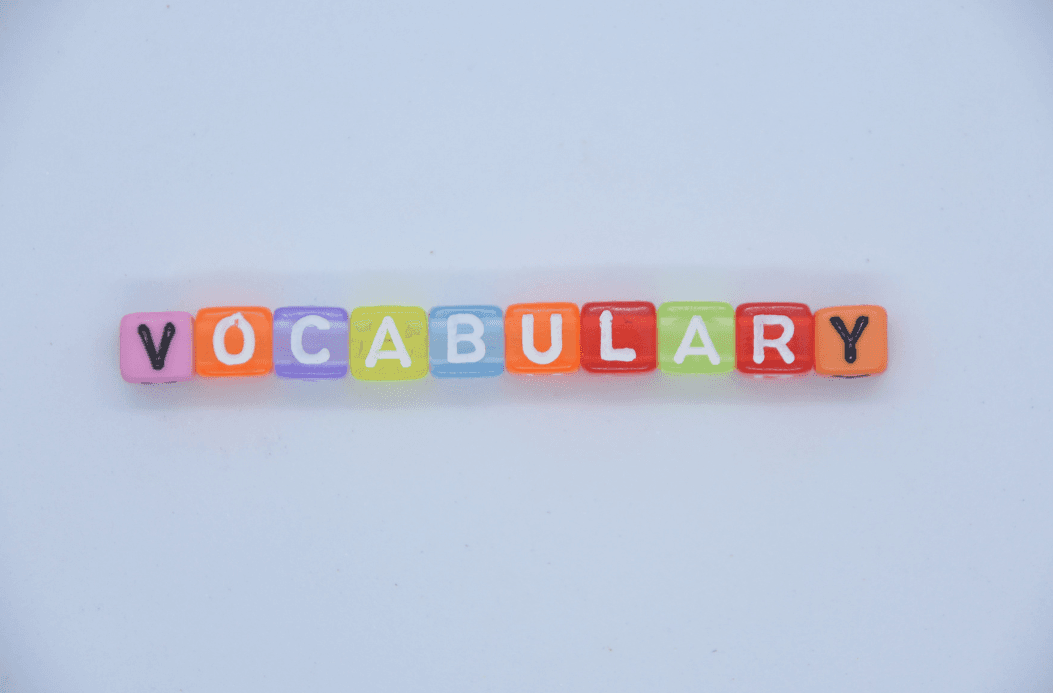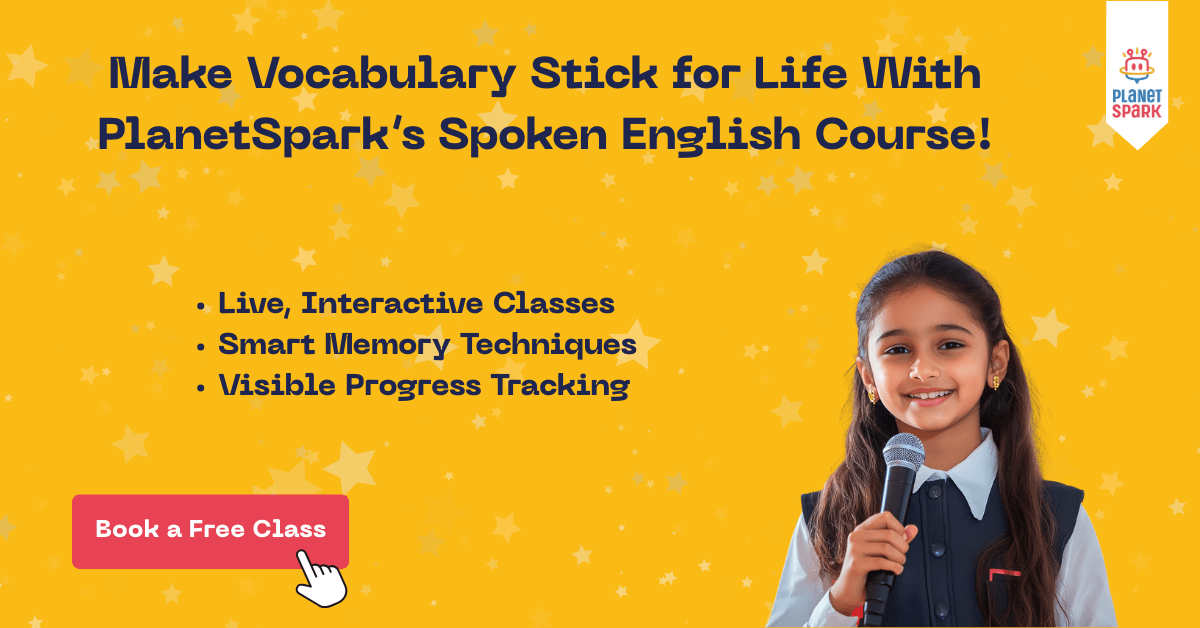Effective Ways to Memorise Vocabulary for Better English Learning
Last Updated At: 19 Aug 2025
9 min read

Have you ever noticed how quickly children forget new words they just learned? One day, they pick up a fancy word from a storybook, and the next day, it disappears from memory. This is because memorising vocabulary is not just about reading or repeating words. It needs smart techniques, practice, and the right environment.
In this blog, we will explore fun, practical, and research-backed strategies that make vocabulary learning simple and long-lasting for kids.
7 Effective Ways to Memorise Vocabulary
1. Use Flashcards Creatively
Flashcards are one of the simplest yet most effective tools. But instead of just writing words and meanings, make them more engaging:
- Add a picture that explains the word visually.
- Write an example sentence along with the word.
- Use colourful cards to make learning fun.
Example: For the word brave, you can show a superhero picture and write: “The brave girl climbed the tall tree.”
This helps children connect the word with an image and a context, making it easier to remember.
2. Learn in Context
Simply memorising definitions doesn’t work. Children remember better when they see how a word is used in real situations. Encourage them to learn words through stories, conversations, or even short daily journals.
Example: Instead of only learning the word curious = “wanting to know,” make a sentence: “The curious cat peeked into the box.”
This way, the word becomes part of their imagination and is stored longer in memory.
Boost your child’s word power today
Book a free demo class with PlanetSpark.
3. Practice with Word Games
Games turn vocabulary learning into play. Children love challenges, and when words are part of the game, they learn without even realising it.
Some fun games include:
- Scrabble or Word Hunt: boost spelling and word recognition.
- Crossword Puzzles: improve recall.
- Vocabulary Bingo: match words with meanings.
- PlanetSpark Word Challenges: interactive online activities that encourage children to use words in fun situations.
Games are one of the most effective ways to memorise vocabulary because they add excitement and repetition without feeling boring.
4. Spaced Repetition Technique
Research shows that the brain forgets words if they are not revised at intervals. Spaced repetition is a technique where words are reviewed at increasing time gaps.
Example Plan:
Day 1: Learn new word
Day 2: Review it
Day 4: Review again
Day 7: Review once more
This gradual revision strengthens long-term memory and ensures the child doesn’t forget words after just a few days.
5. Use Associations and Mnemonics
Associations make learning fun. The idea is to link new words with familiar things, funny images, or rhymes.
Example: Greg is gregarious. To remember gregarious means social, imagine Greg surrounded by friends at a party.
Another example: To remember benevolent (kind), think of “Ben loves to lend help.”
These small tricks make vocabulary sticky in the mind.
6. Group Words by Theme
Children can memorise words faster if they are connected by a theme. This helps them create mental word webs.
Example Themes:
- Emotions: happy, cheerful, joyful, excited
- Animals: lion, tiger, leopard, cheetah
- School Items: pencil, eraser, ruler, notebook
When words are learned together, children recall them easily in related conversations.
7. Speak and Use New Words Daily
The best way to memorise vocabulary is by using it. Encourage your child to practise one or two new words in everyday conversations.
Example Activity: At dinner, ask your child to describe their day using one new word. If the word is delighted, they can say: “I was delighted when my teacher praised me.”
Regular usage makes vocabulary natural and automatic.
8. Read Aloud and Listen Actively
Reading aloud helps children hear the sound of words, which strengthens memory. Listening to audiobooks, stories, or even English songs also exposes kids to correct pronunciation and context.
Example: While reading The Jungle Book, pause at new words like “jungle” or “fearless” and repeat them aloud with your child.
9. Write and Journal with New Words
Writing is a powerful memory tool. Encourage your child to keep a small vocabulary diary where they note down new words with meanings and a personal sentence.
Example: If today’s word is “grateful”, they can write: “I am grateful for my best friend because she shares her toys with me.”
10. Teach Someone Else
One of the most effective ways to memorise vocabulary is by teaching it to another person. When children explain a word to their sibling, parent, or even a toy, they reinforce their own understanding.
Example: If they learned the word “polite”, ask them to teach it to you and use it in 2 sentences.

Discover fun and effective ways to memorise vocabulary
Start learning with experts
Why Memorising Vocabulary Matters
Words are like building blocks of language. Without enough vocabulary, even the most basic sentences become hard to form. When children know more words:
- They can read and understand stories better.
- Their writing becomes richer and more creative.
- They can speak confidently in school, with friends, and in public.
For example, a child with a limited vocabulary may only say, “I am happy.” But a child who has learned more words can express, “I am cheerful,” “I am joyful,” or “I am excited.” These variations not only show language strength but also help kids express emotions more accurately.
That’s why finding effective ways to memorise vocabulary is so important for every learner.
The Science Behind Vocabulary Memory
Before diving into techniques, let’s understand how the brain remembers new words.
When a child first hears or reads a word, it enters their short-term memory. If the word isn’t repeated or used, the brain quickly forgets it. To move the word into long-term memory, it needs regular practice, context, and usage.
This is why children may forget a word they memorised for a test but remember the names of cartoon characters or superheroes for years, because they hear, see, and use them often.
A simple child-friendly example: Learning a word is like planting a seed. To grow into a strong tree, the seed needs sunlight and water. Similarly, new words need practice, repetition, and usage to stay in the brain.
This is the reason strategies like flashcards, games, and spaced repetition are considered the most effective ways to memorise vocabulary. They “water” the word until it becomes part of everyday speech.
How Vocabulary Boosts Confidence
A strong vocabulary is more than just knowing big words, it gives children the power to express themselves clearly and confidently. When kids have the right words, they:
Answer confidently in class: They don’t hesitate because they can explain ideas with ease.
Take part in debates and speeches: A rich vocabulary makes their arguments stronger and more persuasive.
Feel proud when they use new words correctly: Every successful use of a new word adds to their self-esteem.
For example, instead of simply saying “My trip was good,” a child with stronger vocabulary might say, “My trip was exciting and adventurous.” This small change shows not only better expression but also builds confidence to speak in front of others.
That’s why finding effective ways to memorise vocabulary is so important, it directly shapes a child’s ability to communicate and feel self-assured.
Common Mistakes Learners Make
Many children find vocabulary difficult not because the words are hard, but because of small mistakes in the way they learn. Here are the most common ones:
Rote memorisation: Children try to cram only the definition, without learning how to use the word in a sentence.
Learning too many words at once: Memorising 15–20 words in a day often leads to forgetting them quickly.
Skipping revision: If words are not reviewed, they slowly fade from memory.
Ignoring context: Knowing that “benevolent” means kind is not enough. A child should also be able to say, “The benevolent teacher helped the poor students.”
Fix: Focus on fewer words at a time, revise them regularly, and always connect words with examples or real-life situations. These simple adjustments make the most effective ways to memorise vocabulary work even better.

Why PlanetSpark for Vocabulary Building?
PlanetSpark helps kids build fluency, vocabulary, accent clarity, and real-world confidence through:
Daily Live Conversations: Practice real-life situations like school, travel, or interviews.
Clear Pronunciation: Modules on phonetics and reducing mother tongue influence.
Contextual Vocabulary: Words taught through natural dialogues and role plays.
Practical Speaking: Activities like ordering food, giving a speech, or asking for help.
Instant Feedback: AI reports and trainer guidance for fast improvement.
Visible Progress: Confidence trackers and regular updates for parents.
At PlanetSpark, children don’t just learn words, they use them naturally in conversations.
Conclusion
Building a strong word bank is the foundation of confident communication. The most effective ways to memorise vocabulary are not about rote learning but about using words in real-life situations, revising often, and learning in context. When children practice through stories, games, and conversations, words stay in their memory for longer and become part of their natural speech. With the right guidance, every child can unlock the power of words and express themselves with clarity and confidence.
Readers Also Read
If you found these effective ways to memorise vocabulary helpful, you may also like:
FAQs on Effective Ways to Memorise Vocabulary
Q1. What are some effective ways to memorise vocabulary for kids?
A: Using flashcards, connecting words with stories, practicing in conversations, and revising regularly are some of the best strategies.
Q2. How can I help my child remember difficult words?
A: Break words into smaller parts, use them in daily conversations, and connect them with fun examples to make learning stick.
Q3. Is rote memorisation a good method for learning vocabulary?
A: No. Rote memorisation often leads to forgetting. It’s better to learn words in context and through usage.
Q4. How many new words should a child learn daily?
A: Instead of learning too many words, focus on 3–5 words a day and revise them often for long-term retention.
Q5. Can spoken English classes improve vocabulary retention?
A: Yes. Live practice, role plays, and real conversations are among the most effective ways to memorise vocabulary and use it confidently.
Personalized Communication Report
Record a video to get a AI generated personalized communication report for your child
Select Learner's Class

Hi There, want to try these
tips for your child with
LIVE with our expert coach?
Let's check your child's
English fluency
